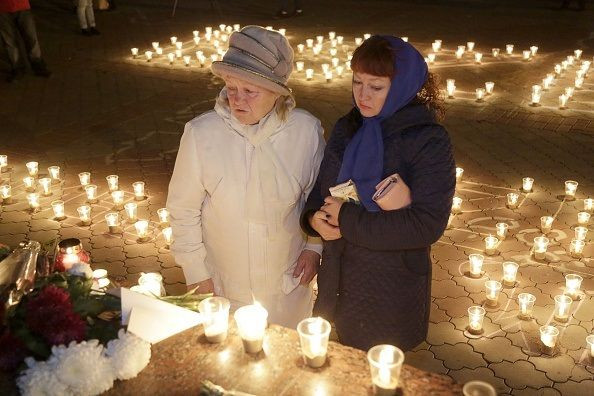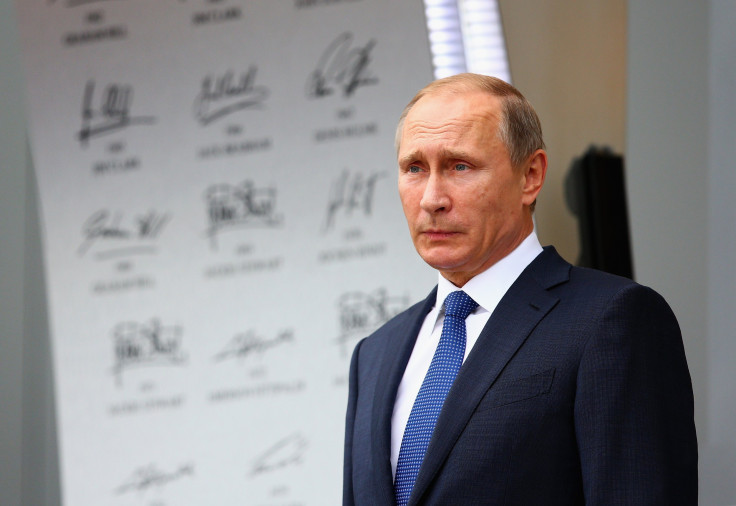Amid Russian Media Reports Following Plane Crash, Will Putin Gain Or Lose Support For Airstrikes In Syria?

Media in Russia have been split over the claim that Islamic militants were responsible for this weekend’s fatal crash of a Russian plane in the Sinai Peninsula, with some news outlets fervently supporting terrorist claims while others patently denied them. But whether allegations of terrorist involvement in the crash -- the deadliest in Russia’s history -- turn out to be true, support for Russian President Vladimir Putin and his military’s actions in the Middle East will likely remain strong, particularly thanks to the Kremlin’s control over the media, analysts said.
If they’re right, the campaign in Syria will continue to be seen as a way of neutralizing a terror threat before it spreads to the homeland, and Saturday’s deadly crash may even spur more support for Putin’s campaign there. “The terrorist threat is real for Russians,” said Ekaterina Zabrovskaya, a veteran Russian journalist now based out of the U.S. “It can happen anywhere.”
The crash that killed 224 people in Egypt came amid ongoing airstrikes by Russia in Syria, which Russian media have reported as targeting the Islamic State militant group, also known as ISIS. Russian strikes also targeted rebels fighting against Kremlin loyalist and Syrian President Bashar Assad, according to authorities in the region, including U.S. defense officials.
“I’m afraid that [the Islamic State group], these bloodthirsty terrorists, will come to Russia and behead people,” one elderly Russian woman told the Washington Times in October, shortly after the poll was published.

Part of the support for Putin's campaign in Syria stems from Russia’s history of domestic terrorism, with attacks perpetrated by Islamic extremists as early as the 1990s in the Chechen region. As a result, there has been a united push to fight the war against extremism abroad rather than at home. “[Russian people] do support the fight against terrorism because it is and was such an important topic,” said Zabrovskaya.
Authorities in Egypt and Russia have continued to search for evidence as to what caused the crash Saturday, and no set conclusions had been reached. Russian media has been fairly cautious, urging citizens to wait for the results of an official probe, with many news sources insisting that the plane was not downed by militants. Most media coverage coming out of Russia has instead shifted to focus on the military campaign in Syria.
Several Russian government authorities and media outlets have also said the cause of the crash was not technical failures and must have been “external forces.” By saying the plane went down because of external forces, authorities were effectively deflecting blame from any Russian source, said Russian historian Martin McCauley, a former professor at King’s College in London.
“Under no circumstances must it appear that it was a technical fault,” McCauley said before adding: “That would reflect Russian incompetence.”

Russian media, which is majority owned or controlled by the Kremlin, has historically reported some version of the government’s official accounts of events. “[Russian people] only hear the information which the masters of information in Moscow decide it’s wise to tell them,” McCauley said Monday.
In countries such as Japan or Jordan, for instance, after soldiers were killed by ISIS, there was public resistance to sending troops to fight in Syria. A terrorist narrative would likely have the opposite effect and would reinforce Russia’s mission in Syria instead of challenging it, according to McCauley. “This will strengthen Putin’s argument that we need to get in Syria and fight them there before they come to the caucuses,” he said.
While fallout of this attack would likely have a limited effect on approval for Putin's campaign in Syria, any effect it did have would be positive, said Jacob Funke Kierkegaard, a policy analyst for the U.S.-based think tank the Peterson Institute for International Economics. "I would expect the Russian population to actually double-down [on Syria]," said Kirkegaard.
A Russian airline has ruled out technical failure or pilot error in Egypt crash https://t.co/bFp7yDauzH pic.twitter.com/panw5efqHf
— The New York Times (@nytimes) November 2, 2015Russia continued to rev up its presence in Syria Monday, with the Russian defense ministry reporting its planes had flown 131 sorties and hit 237 targets in the past two days. In contrast, Russia carried out hundreds of strikes in the past month, killing around 130 ISIS militants, according to a Syrian-based monitoring group. The defense ministry did not give a motivating factor behind this week’s push for increased airstrikes.
As fighting in Syria continued, the bodies of the Russians who died in Saturday's crash were flown back home while the search for more evidence continued. Putin, as quoted by Russian news agency Tass, was noncommittal to the catastrophe's cause. "Without any doubt, everything should be done so that an objective picture of what happened is created, so that we know what happened," he said. "This work should be continued until we are fully sure that this stage is complete."
The uncertainty of the situation was underscored by another Russian media outlet, which for all intents and purposes seemed to downplay Putin's culpability in the controversy.
"We cannot rule out that terrorists could have had a hand in the air disaster," read one excerpt published Sunday in highly circulated Moskovskiy Komsomolets. "It is well known that since Russia started a military operation in Syria, a number of jihadist groups have declared a 'holy war' against Russia and its citizens."
Lydia Tomkiw contributed to this report.
© Copyright IBTimes 2025. All rights reserved.





















